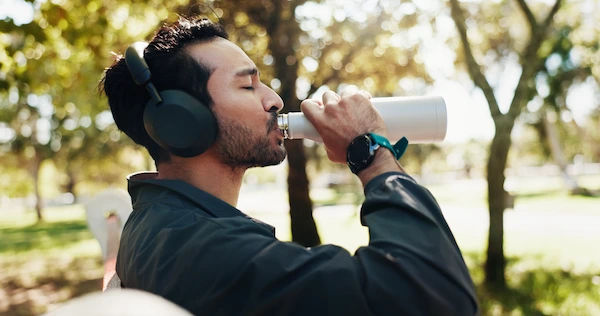Exercise and Sleep: Finding the Balance
Unlock optimal well-being by balancing exercise and sleep. Discover how workout timing, intensity, and recovery impact your rest, and learn practical strategies to maximize both for better health and performance.

Written by Dr. J T Hema Pratima
Reviewed by Dr. D Bhanu Prakash MBBS, AFIH, Advanced certificate in critical care medicine, Fellowship in critical care medicine
Last updated on 28th Jul, 2025

Sleep and exercise are two of the most important pillars of good health. When balanced correctly, they can improve your energy, mood, and overall wellbeing. However, many people struggle to find the right balance—either exercising too much and disrupting sleep or not exercising enough, leading to poor sleep quality.
In this article, we’ll explore how exercise affects sleep, the best types of workouts for better rest, and simple tips to help you find the perfect balance.
How Exercise Improves Sleep?
Regular physical activity has been proven to help people fall asleep faster, stay asleep longer, and enjoy deeper, more restorative sleep. Here’s how exercise benefits sleep:
Reduces Stress and Anxiety – Exercise releases endorphins (feelgood hormones) that help lower stress and anxiety, common culprits of insomnia.
Regulates Your Body Clock – Physical activity, especially in natural daylight, helps regulate your circadian rhythm (your body’s internal clock), making it easier to fall asleep at night.
Promotes Deep Sleep – Moderate exercise increases the amount of deep (slowwave) sleep, which is essential for physical recovery and mental clarity.
Helps with Weight Management – Being overweight can contribute to sleep disorders like sleep apnea. Exercise helps maintain a healthy weight, reducing such risks.
Best Types of Exercise for Better Sleep
Not all exercises affect sleep the same way. Here are some of the best types of workouts for improving sleep quality:
1. Aerobic Exercise (Cardio)
Examples: Walking, jogging, cycling, swimming.
Benefits: Helps reduce insomnia and improves sleep duration.
Best Time: Morning or afternoon (avoid intense cardio close to bedtime).
2. Strength Training
Examples: Weight lifting, resistance band exercises, bodyweight workouts.
Benefits: Strengthens muscles, reduces stress, and improves sleep quality.
Best Time: Early evening (at least 3 hours before bed).
3. Yoga and Stretching
Examples: Gentle yoga, deep breathing exercises, Pilates.
Benefits: Relaxes the mind and body, reducing nighttime restlessness.
Best Time: Evening (great for winding down before bed).
4. HighIntensity Interval Training (HIIT)
Examples: Sprint intervals, circuit training.
Benefits: Boosts metabolism and improves sleep efficiency.
Best Time: Morning or early afternoon (too close to bedtime may disrupt sleep).
When Should You Avoid Exercise Before Bed?
While exercise generally improves sleep, intense workouts too close to bedtime can have the opposite effect. Vigorous exercise raises your heart rate, body temperature, and adrenaline levels, making it harder to fall asleep.
Avoid high-intensity workouts at least 23 hours before bedtime. Instead, opt for relaxing activities like:
Gentle stretching
Meditation or deep breathing
A short evening walk
Consult a Top Psychologist
Signs You’re Not Balancing Exercise and Sleep Properly
If you notice any of these signs, you may need to adjust your exercise routine or sleep habits:
Difficulty falling asleep despite feeling tired
Waking up frequently during the night
Feeling exhausted instead of refreshed after a workout
Increased muscle soreness without proper recovery
Tips for Finding the Right Balance
Tips for finding the right balance:
1. Listen to Your Body
If you feel too energized after evening workouts, shift exercise to earlier in the day.
If you’re exhausted but still can’t sleep, try relaxation techniques.
2. Stick to a Consistent Sleep Schedule
Go to bed and wake up at the same time daily, even on weekends.
A regular sleep routine helps your body adapt better to exercise.
3. Avoid LateNight Heavy Meals or Caffeine
Eating too close to bedtime or consuming caffeine can interfere with sleep.
Opt for light, sleep-friendly snacks like bananas or warm milk.
4. Create a Relaxing Bedtime Routine
Dim the lights, read a book, or take a warm bath before bed.
Avoid screens (phones, TV) at least an hour before sleep.
5. Monitor Your Progress
Keep a sleep diary to track how different exercises affect your rest.
Adjust your routine based on what works best for you.
When to Seek Help?
If you’ve tried adjusting your exercise and sleep habits but still struggle with insomnia, fatigue, or poor recovery, it may be time to consult a doctor. Conditions like sleep apnea, chronic stress, or hormonal imbalances could be affecting your rest.
Need personalized advice? You can book a consultation with a sleep specialist or fitness expert through Apollo 24|7 to get tailored recommendations for your needs.
Final Thoughts
Finding the right balance between exercise and sleep is key to feeling your best. Regular physical activity improves sleep quality, while good sleep enhances workout recovery and performance. By choosing the right type of exercise, timing it wisely, and maintaining healthy sleep habits, you can enjoy the benefits of both. Start small, listen to your body, and make gradual changes. A well rested, active lifestyle is within your reach! Schedule a consultation with experts on Apollo 24|7 today!
Consult a Top Psychologist
Consult a Top Psychologist

Dr. Vivek S
Psychologist
13 Years • Ph. D. in Psycho-sexual Counselling, Psychotherapy & Sex Therapy, Certificate in Advance level in Psychology
Pune
Purl Wellness, Pune

Miss. Vaishnavi Sankeshwar
Psychologist
5 Years • Msc Clinical Psychology
Bengaluru
Apollo Clinic, JP nagar, Bengaluru

Mr. Aman Kochhar
Psychologist
2 Years • MA - Psychology, Post Graduate Diploma In Guidance and Counselling
New Delhi
Well-mind Counselling, New Delhi

Ms. Monalisa Kha Bhaduri
Psychologist
12 Years • MA Psychology
Kolkata
Ms Monalisa Kha Bhaduri's Clinic, Kolkata
(225+ Patients)

Ms. Gunjan Arya
Psychologist
4 Years • MA Psychology
Delhi
Psych Therapy By Gunjan Arya, Delhi




